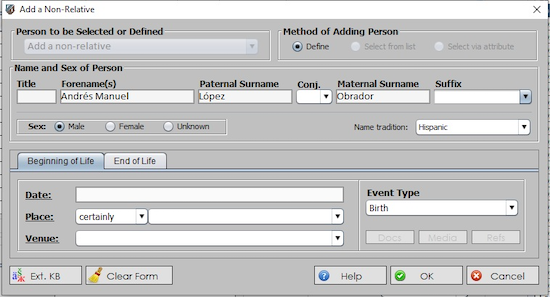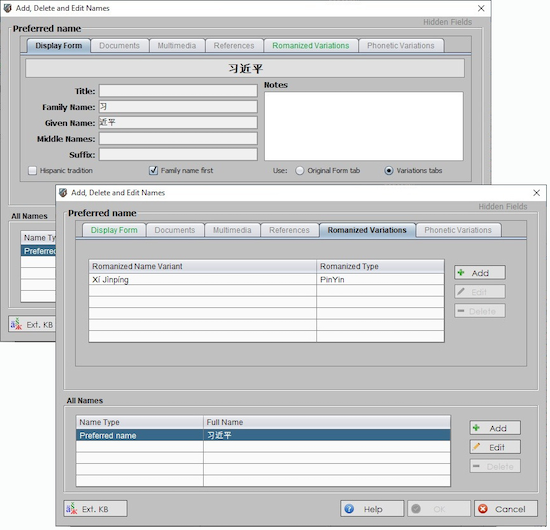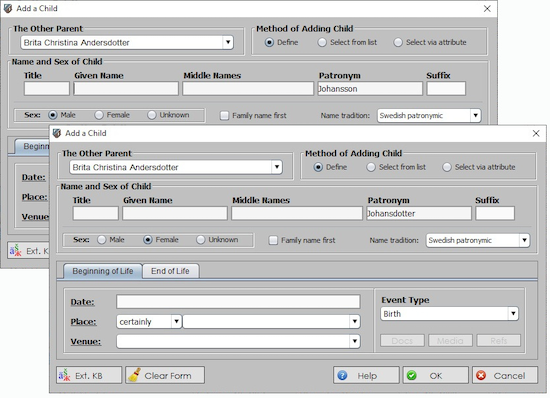The following announcement was written by the folks at rootstrust:
Do you have Hispanic names in your family tree or among the members of your extended family? If you do, you have likely noticed that some genealogy programs do not allow them to be properly entered. The reason is that Hispanic names do not fit the mold of Anglo-American name components: forename, middle names and surname. Hispanic names can have multiple forenames, no middle names, a paternal surname and a maternal surname. The two surnames may be separated by a space, a hyphen or the conjunction ‘e’ or ‘y’. In addition, married females retain their surnames but may append to their name the preposition ‘de’ followed by their husband’s surnames.
For example, the president of Mexico is Andrés Manuel López Obrador. His forenames are Andrés and Manuel, his paternal surname is López and his maternal surname is Obrador. His first lady is Beatriz Gutiérrez Müller de López Obrador. Such names, especially the female ones, provide enough information to start a pedigree chart.
The current version of rootstrust (Build 411.1) that can be downloaded from rootstrust.com, supports the Hispanic naming tradition. Hispanic names can be entered component by component.

When you add a child or children of Hispanic parents, the forms will be prepopulated with the parents’ paternal and maternal surnames. The name search form also accommodates the idiosyncrasies of Hispanic names.
Prior to adding support for Hispanic names, rootstrust already accommodated two other types of unconventional personal names:
-
-
Family name first. Hungarian names and the names of most far-eastern countries and parts of India place the family name before the given names. For example, we refer to the president of Hungary as Viktor Mihaly Orban, yet in Hungary he is Orbán Viktor Mihály. The Chinese president is Xi Jinping, but many westerners do not realize that the Xi is his family name. And to make things more complicated, the components of Hungarian names are separated by spaces, and honorific titles such as Dr. precede the family name. The parts of a far-eastern name are not separated by spaces, and honorific titles follow the family name. Thus, Dr. John Smith would be smithdr.john. rootstrust automatically handles these cultural idiosyncrasies for the user and optionally lets you specify whether a person’s name is to be displayed with the family name in initial position. With rootstrust you can even maintain foreign names in their native character set as well as their Romanized equivalents (习近平 and Xí Jìnpíng) as shown below.

Note: the green tab titles in the above figure indicate that the tab has content.
-
-
Patronymic names. Such names were frequently used instead of fixed surnames in past centuries in Scandinavia, Iceland, Finland, the Netherlands, Dutch Colonial America and the Ottoman Empire. A patronym is the father’s given name with a gender suffix (Johanssson, Johansdotter). Fixed surnames remain the same, generation after generation, whereas patronyms change each generation. If the father’s naming tradition has been appropriately set, rootstrust will automatically generate the patronyms of children as you add them. Similarly, if a child’s naming tradition is set to a patronymic type, the father’s given name will be automatically provided when adding the parents. In the following screenshots notice the difference in the automatically generated male and female patronyms. The father’s name was Johan Bengtsson, and he was the son of Bengt Svensson.

So, if your current genealogy program does not allow you to deal with unconventional personal names in an acceptable manner, give rootstrust a try. You can download it for Windows, macOS, Linux or ChromeOS at rootstrust.com, and you can test it free of charge for 30 days.